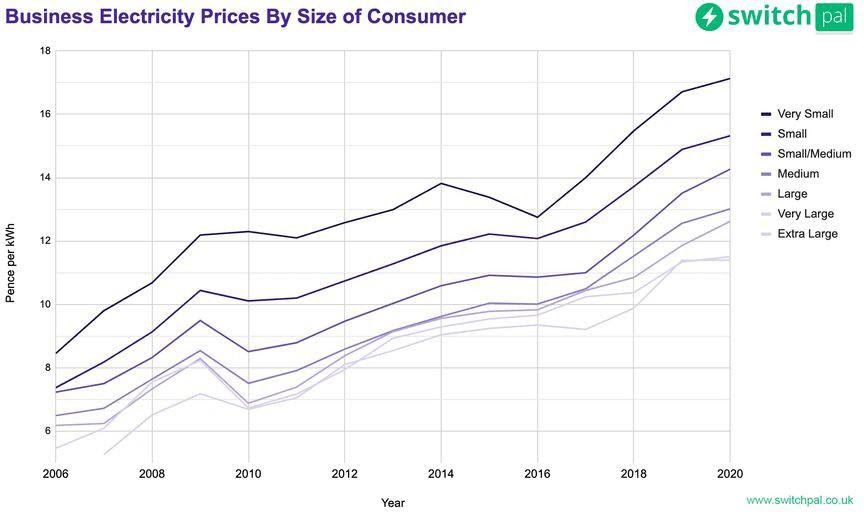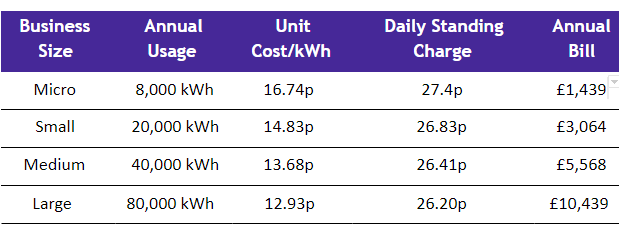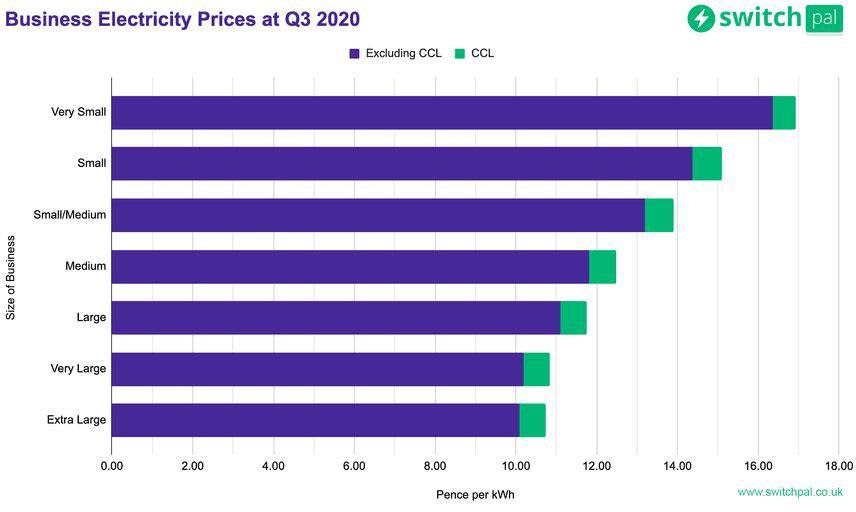How Does Business Electricity Pricing Work?
This post was last updated on October 18th, 2023
Business electricity plans are not the same as domestic ones, and are generally more complex to compare prices and find the best deal.
Firstly, you don’t have to use the same supplier for both gas and electric, although doing so can sometimes offer more competitive ‘dual fuel’ deals. It’s therefore important to get a variety of quotes, for example, check out Texas electricity comparison so you can accurately compare prices.
The unit rate per kWh is based on the size of your business. Small businesses pay more while larger businesses pay less. Every business is different and will have varying requirements based on their business practices and needs.
Again, this makes it even more important to use a price comparison service like ours. All you need to do is to fill out this form with a few simple contact details and we will be able to offer a range of options from a variety of suppliers – from the Big Six to smaller and independent suppliers.

What Are The Different Business Electricity Tariff Types And Contracts?
To understand how business electricity pricing works, it’s essential first to learn ”how to read my electric bill” and then familiarize yourself with the specific terminologies.
Below, we will discuss the different types of electricity tariffs types and contracts for enhancing your overall knowledge of your electricity bill:
Fixed Rate Contract
Fixed rate business electricity tariffs allow you to ‘lock in’ the unit price that you pay for the duration of the contract. Normally this is around 1 – 3 years but can vary between suppliers. Fixed rates are usually more competitive than other tariffs and are recommended as they offer the best deal.
Deemed Rates
When you move into new premises with no formal arrangement in place regarding your electricity and gas charges you’ll find yourself on a deemed
Business rate contract. Deemed rates are higher than contracted rates, so you could save a lot of money by switching to another deal.
The advantage of being on a deemed rate is that you can switch to a different tariff whenever is convenient for you, usually by giving 28 days notice.
Rolling Contract
These are becoming less common as deemed rates are used instead. With a rolling contract you’ll be tied in for 1 year at a fixed unit price, which would be at a higher cost when compared to a fixed rate contract.
Green Energy
Green tariffs are becoming increasingly popular amongst businesses who want to improve their Corporate Social Responsibility (CSR) and reduce their carbon footprint. They aren’t always the most expensive tariff either, so it’s good to shop around.
Whilst there are a few tariff types there are still different terms that can be negotiated within them. Using an energy broker like SwitchPal is highly recommended as you can get quotes from a variety of suppliers across the whole market, ensuring you get the best rates for your business.
What Is Unit Rate And Standing Charge?
Unit Rate
The unit rate is the price (in pence) per unit of energy that your business uses. Unit rate is measured in Kwh and will be the bulk of your electricity costs.
Standing Charge
Standing charge is a daily fee regardless of how much electricity your business uses. It covers the cost of supplying electricity to your business as well as maintaining the national grid.
It’s important not to ignore the standing charge as it can be quite significant when calculated over a period of time.
Latest Business Electricity Tariffs Compared
The table below shows electricity prices for various suppliers around the UK. As you can see, the unit costs and standing charges vary between providers, making it all the more important to shop around for the best electricity deal.
| Energy Supplier | Unit Cost/kWh | Daily Standing Charge | Annual Bill |
| British Gas Lite | 14.82p | 24.69p | £3,795.12 |
| British Gas | 15.22p | 29.45p | £3,912.49 |
| Dual Energy | 14.95p | 23.08p | £3,821.74 |
| EDF Energy | 15.90p | 25.00p | £4,066.25 |
| E.ON | 14.86p | 31.00p | £3,828.15 |
| nPower | 14.00p | 23.54p | £3,585.92 |
| Octopus Business | 15.26p | 24.10p | £3,902.96 |
| Opus Energy | 15.26p | 25.00p | £3,996.25 |
| Scottish Power | 14.80p | 26.15p | £3,795.45 |
| SSE | 15.38p | 29.85p | £4,123.46 |
| Total GP | 15.19p | 30.34p | £3,908.24 |
What Is The Average Price For Business Electricity?
Electricity prices are changing multiple times every year in line with supply and demand and other market forces. The graph below shows the change in business electricity prices for the last 14 years, depending on the size of the business. As you can see prices have steadily increased each year, and the smaller your business is (i.e. the lower the amount of energy consumed) the higher the cost per kWh.

Data source: gov.uk
This graph illustrates the importance of always being on the best tariff for your business, and constantly reviewing your situation periodically as the market changes. This is why a service like SwitchPal can save business a lot of time and energy trying to keep on top of this.
How Do I Get Cheaper Electricity Rates?
If your business hasn’t switched electricity providers in a few years then it’s
likely that automatic rate increases have crept their way into your contract. In this situation it makes sense to look for a new contract at a better rate.
It’s also possible to find tariffs with zero standing charge, which is good for seasonal businesses or ones that are only open certain days of the week.
Suppliers can also offer different rates depending on the time of day, so you should think about what makes sense for how your business operates.
Don’t forget to think about dual fuel options, where you can combine your gas and electricity costs into one consolidated bill. This is not only easier and more convenient, but usually cheaper too (although not always, and can depend on your usage, so remember to shop around!). You can even opt for paperless billing, which might further reduce the cost.
How you pay for your energy can also affect the price. You can usually pay using credit card, direct debit or through a pre-paid meter, with direct debit generally being the cheapest payment method.
One of the best ways to find the best electricity rate for your business is to get a variety of quotes from different suppliers and compare them. Simply fill in our form with a few details and we can supply you with quotes from across the entire energy market.
Does My Business Need A Half Hourly Meter?
If your business demands 100Kwh or more of electricity in any given half hour period then by law you require half-hourly metering.
If this is the case you will most likely need a tailored price based on your usage requirements.
Are There Regional Variations In Business Electricity Rates?
Electricity prices can and do vary between regions of the UK. This is due to differences in supply and demand at each location, as well as infrastructure in place to transport energy to your business premises.
Generally this cost is passed on to you, the customer, which is why we see the variance in prices across the UK.
There’s not a lot you can do about your business postcode, but you can still ensure you’re on the cheapest rate available in your area.
Are Business Electricity Rates Cheaper Than Domestic?
Business rates depend largely on the size of the business and the amount of electricity used. Business unit rates (price per Kwh) might be cheaper because of the amount of gas and electricity used, but they pay 20% VAT as opposed to a reduced VAT rate of 5% for domestic electricity.
Do Small Businesses Pay More For Electricity Than Large Ones?
The table below shows a breakdown of annual electricity costs based on the size of business and annual usage. The smaller the business, the higher the daily standing charge and unit cost.

The graph below breaks this down into more granular detail and also includes the Climate Change Levy (CCL) which came into effect in April 2001.

Data source: gov.uk
Larger businesses generally source cheaper energy deals due to economies of scale. They will use more energy per day and therefore gain access to favourable rates.
Bigger corporations are also more likely to shop around for better deals compared to smaller businesses, and they’re usually more proactive about switching when automatic rollover contracts kick in.
It’s a good idea to set up a calendar reminder for when your current electricity contract is due to expire so you can begin switching at the right time.
Summary
SwitchPal compares multiple trusted energy suppliers across the entire market, ensuring businesses get the best deal. By working with the UK’s leading energy brokers SwitchPal will secure the best possible price for commercial gas and electricity tariffs. With some basic information about a business, SwitchPal can easily compare energy plans and choose the right one for the business.
See how much you could save on your business energy. Get a free online quote today.
Most Inside
Most Inside offers high-quality recommendations and valuable updates to enhance all aspects of your life, providing premium guidance and enriching experiences.




